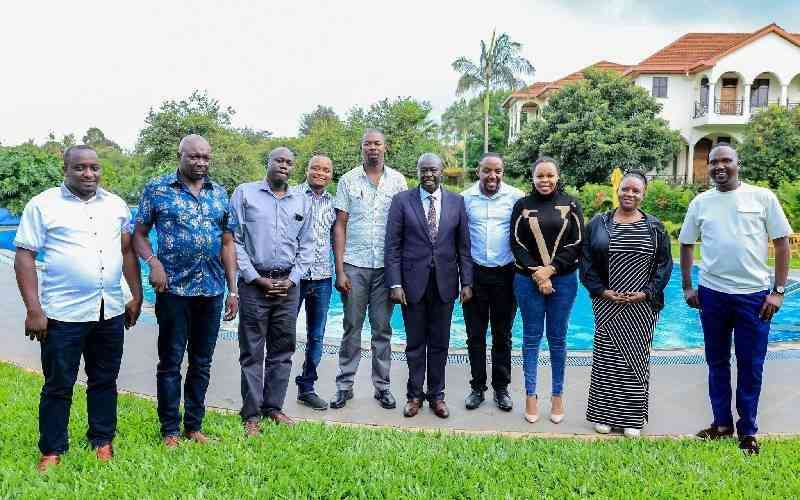BY ERIC WAINAINA
Kiambu, Kenya: It is believed that Kiambu was from the beginning destined to be the richest county in the country.
It has resources ranging from tourist attraction sites and water to forests, wildlife and minerals. Indeed, if all these are tapped, the county can only compete with other rich counties in developed countries.
Kiambu is a major water supplier, contributing over 60 per cent of the water consumed by Nairobi residents; sourced from Ruiru and Ngethu dams as well as from the Kikuyu Springs.
Ironically, most of the residents depend more on boreholes drilled by local water companies while others get the precious commodity from streams near their homes.
The Kiambu Water and Sewerage Company (KWSC) serves its clients with fluoride-treated water from 12 boreholes. It also buys 50 per cent of the supply from Nairobi Water Sewerage Company, which interestingly gets its supply from the county, says James Mbugua, the managing director at the KWSC.
Although the fluoride is a welcome effort to ensuring safety, many residents find the concentration too high to drink. For example, Mercy Wanjiku, who lives in Kiambu town, buys bottled water for her family to drink despite her rented house having tap water.
Senator Kimani Wamatangi said it is unfortunate that Kiambu people buy water from the Nairobi company and drink water from boreholes and rivers yet the county is a major water supplier. He says the residents should be given a priority.
However, this rich county is not just worried about non-exploitation of water for the benefit of locals. The locals and leaders The Standard spoke to say investors in the county are not adequately benefiting the residents and the general growth of the county.
Natural gases
They cite other natural resources; carbon dioxide and other gases, which are extracted in Lari sub-county as not benefiting the county at all.
A multi-billion company extracts the gases, which are used in applications such as laboratories, refrigeration systems, aerosol propellant products, high technology medical and pharmaceutical processes, environmental emission control, and food processing.
The company’s distribution network extends across East Africa, serving customers in Kenya, Uganda, Tanzania, Rwanda, Burundi, Ethiopia, Uganda, Zambia, South Sudan and Somaliland.
However, the county reaps little from this major resource. Apart from casual labour jobs, local people hardly benefit, adds Senator Wamatangi.
“Investors reap from our natural resources but the local community does not benefit. This is why the senate wants to ensure locals enjoy the benefits accrued from the resources, which are in their counties that include game parks or reserves and minerals,” says Wamatangi.
Stay informed. Subscribe to our newsletter
There are other resources that are yet to be exploited in the county.
The county is said to have deposits of diatomite in Ndeiya, Limuru, used in pharmaceutical industries to sieve medicine, but these are yet to be exploited.
Wamatangi, the vice chairman of the Senate Committee on Legislation on Royalties Accruing from Natural Resources, says the Senate is fast-tracking legislation that compels investors to remit a percentage of profits they make from natural resources to counties.
Legislation
“Most counties have natural resources including minerals but investors only give locals labour jobs and the counties never benefit from the resources. This situation is the same across the counties and that is what we want to address,” Wamatangi said.
But then, for the counties to benefit from the natural resources, the residents must take care of their resources. In Kiambu, the county government has been challenged to utilise the forests such as Kereita, Kinale, Kieni and Kamae situated in Lari and Gatundu North, which have been encroached.
Lari MP Mburu Kahangara says despite locals taking part in the forest conservation, they never reap anything. He says during tree harvesting, the opportunities are given to investors from far areas.
 The Standard Group Plc is a
multi-media organization with investments in media platforms spanning newspaper
print operations, television, radio broadcasting, digital and online services. The
Standard Group is recognized as a leading multi-media house in Kenya with a key
influence in matters of national and international interest.
The Standard Group Plc is a
multi-media organization with investments in media platforms spanning newspaper
print operations, television, radio broadcasting, digital and online services. The
Standard Group is recognized as a leading multi-media house in Kenya with a key
influence in matters of national and international interest.
 The Standard Group Plc is a
multi-media organization with investments in media platforms spanning newspaper
print operations, television, radio broadcasting, digital and online services. The
Standard Group is recognized as a leading multi-media house in Kenya with a key
influence in matters of national and international interest.
The Standard Group Plc is a
multi-media organization with investments in media platforms spanning newspaper
print operations, television, radio broadcasting, digital and online services. The
Standard Group is recognized as a leading multi-media house in Kenya with a key
influence in matters of national and international interest.








